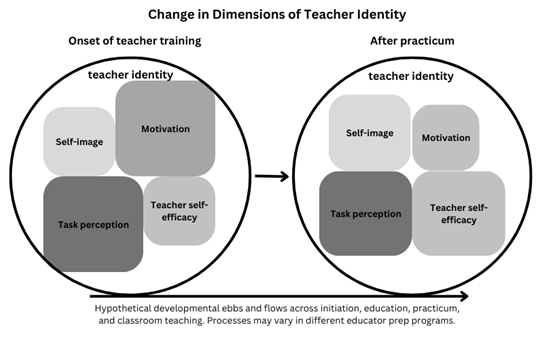About the Development of Teacher Identity
Teacher retention is at the forefront of global concern, as the International Task Force on Teacher for Education and others have noted. A well-developed professional identity can improve teachers’ confidence in their decision to work in education and their commitment to the profession (Rots et al., 2010). As noted by Kaplan, Garner, and Semo (2015), successful teacher education programs must address the complex processes involved with development of teacher identity, as myriad socio-cultural aspects influence identity, in addition to providing pre-service teachers with rigorous training in content and pedagogy. Evidence shows that a strong and stable professional identity is positively related not only to emotional well-being (Zembylas, 2013), but also to the quality of teaching in the classroom (Agee, 2004; Beijaard, 2009) and teacher effectiveness (Alsup, 2005), suggesting implications for teacher retention.Objectives
This study seeks to answer the following research questions:
1. To what extent does the Teacher Identity Measurement Scale (TIMS) demonstrate validity in measuring aspects of teacher identity within populations of teachers in Nebraska as assessed through content analysis, expert review, and correlational analysis with established measures?
2. How do teacher identity and student self-analysis of contextual factors change through teacher preparation that occurs in undergraduate programs?
a) What is the role of practicum/clinical practice, and first year teaching?
3. How do teacher identity and student self-analysis of contextual factors change through non-traditional teacher preparation programs such as master’s degree programs or emergency credentialing for working professionals?
a) What is the role of practicum/clinical practice, and first year teaching?
4. What programmatic and contextual factors explain differences in the development of teacher identity in traditional vs. non-traditional programs?
a) How do these differences manifest across international settings?

Current status of the project
Summer + Fall 2025 - Cody Friend’s FUSE grant work will contribute to these research aims, in a comparison of types of educator preparation programs.
We are actively submitting grant proposals to receive funding for the validation of the TIMS, in collaboration with Jay Jeffries, PhD, and the NEAR Center at University of Nebraska-Lincoln.
Future development
Data collection to begin in Fall 2025